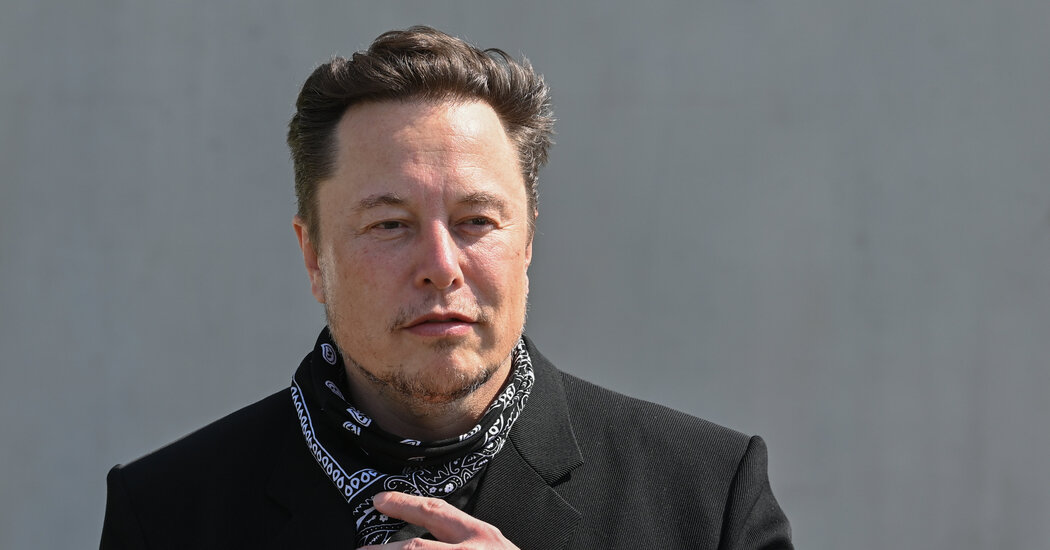To most people outside of Silicon Valley, it might seem obvious that Elon Musk’s ownership of Twitter has been an unmitigated disaster.
In less than two months since he took over, Mr. Musk fired more than half of Twitter’s staff, chased away many of its big advertisers, made (and reversed) a series of ill-advised changes to the verification program, angered regulators and politicians with erratic and abusive tweets, declared a short-lived war on Apple , greenlit a bizarre “Twitter Files” revelation, stopped paying rent on Twitter offices and falsely accused the company’s former head of trust and security of supporting pedophilia. His personal fortune has dwindled by billions of dollars and he was booed on a Dave Chappelle show.
He’s not doing well in almost any way. And yet one group is still firmly in Mr. Musk: Bosses.
In recent weeks, many tech executives, founders and investors have expressed their admiration for Mr. Musk, even though the billionaire has fluttered on Twitter.
Reed Hastings, the CEO of Netflix, praised Mr. Musk at a New York Times DealBook conference late last month, calling him “the bravest, most creative person on the planet.”
Gavin Baker, a private equity investor, recently claimed that many venture capital-funded CEOs were “inspired by Elon”.
And several partners of Andreessen Horowitz, the influential venture capital firm, have tweeted similar encomia to Mr. Musk’s leadership style.
On Elon Musk’s Twitter
Part of the elite’s cheerleading probably boils down to class solidarity or naked financial self-interest. (Andreessen Horowitz, for example, invested $400 million in Mr. Musk’s acquisition of Twitter.) And some of it may reflect the leftover goodwill from Mr. Musk’s successes at Tesla and SpaceX.
But as I’ve been calling around C-suite executives and influential investors in Silicon Valley over the past few weeks, I’ve been surprised by how many people are behind Mr. Musk stand – even if they won’t admit it publicly.
Musk’s defenders point out that Twitter has not collapsed or gone offline despite losing thousands of employees as some critics had predicted. They see his tough management style as a necessary correction and they believe he will eventually be rewarded for cutting costs and getting the law right.
“He says the things many CEOs want them to say, and then he actually does them,” said Roy Bahat, a venture capitalist at Bloomberg Beta.
Mr Bahat, who has criticized some of Mr Musk’s moves, characterized his Twitter tenure as a “living natural experiment” – a divisive but enlightening window into what other executives could get away with, if they tried .
“He gives people a lot more knowledge of what’s possible,” he said.
Tech elites don’t support Mr. Musk simply because they personally like him or agree with his anti-woke political crusades. (Although a few do.)

Kevin Roose and Casey Newton are the hosts of Hard Fork, a podcast that provides insight into the rapidly changing world of technology. Subscribe and listen.
Rather, they see him as the standard-bearer of an emerging worldview that they hope will catch on more widely in Silicon Valley.
The writer John Ganz has called this worldview “bossism” – a belief that the people who build and run major tech companies have relinquished too much power to the entitled, lazy, overly awake people who work for them and must begin to take it back. claws.
According to Mr. Ganz, the main proponents of bossism in Silicon Valley – including Mr. Musk and financiers Marc Andreessen and Peter Thiel – are seizing the opportunity to pull the culture of the tech industry sharply to the right and to push left-wing workers and labor sympathizers to the right. to bring down. peg as they restore themselves and their fellow bosses to their rightful places atop the totem pole.
Some Musk sympathizers see things in such stark, politicized terms. For example, the writer and crypto founder Antonio García Martínez greeted Musk’s Twitter takeover as “an entrepreneurial capital revolt” against the “ESG grifters” and “Skittles-hair folks” who populate the rank and file at companies like Twitter.
But while some tech CEOs may blame a dormant cell of gender studies majors for their troubles, many of Mr. Musk’s elite fans cling to a more straightforward, business-school type of boss. They admire him for ruling Twitter with an iron fist and making the kind of moves that tech executives have resisted for fear of alienating employees—cutting jobs, taking fringe benefits, punishing internal dissenters, opposing social security efforts. diversity and inclusion and forcing employees to return to the office.
These bosses believe that over the past decade, a thriving technology industry and a talent shortage have forced many CEOs to make unreasonable concessions. They spoiled the workers with perks like lavish meals and kombucha on tap. They agreed to use workplace chat apps like Slack, which flattened office hierarchies and gave junior employees a way to directly challenge leadership. They went to great lengths to accede to employee demands — DEI workshops, flexible remote work policies, corporate wellness days — to keep them happy and prevent them from switching to a competitor.
Then Elon Musk showed up on Twitter and refused to even do that. Instead of trying to curry favor with Twitter’s employees, Musk fired many of them and challenged the rest to quit – forcing them to testify that they were “extremely hard core” if they wanted their jobs preserve. He had done this before at his other companies. But at Twitter, he did it all openly, using his Twitter account as a cudgel to keep workers in line.
Twitter’s former leaders, steeped in the conciliatory style of boom-time management, had fostered an atmosphere of open debate and discussion—one of the company’s core values was “communicating fearlessly to build trust”—but Mr. Musk replaced that with a culture of absolute loyalty. He publicly stripped Twitter employees and fired anyone who dared to criticize him. He was particularly dismissive of the company’s diversity and inclusion efforts — mocking an old “Stay Woke” T-shirt found in a Twitter closet and disbanding the company’s staff groups (including groups for black, LGBTQ and female employees).
To many people, the movements of Mr. Musk a case study on how not to run a company. But to some Silicon Valley elites, they were a lightning bolt — a long-awaited answer to the question, “What if we just treated workers worse?”
Bosses may disagree with every move Mr. Musk makes, but many of them think he’s right about the big picture. Tech companies are bloated and unproductive. Woke’s HR departments have gone too far. Workers need to stop being activists and focus on their jobs.
Mr. Musk is not the first technology leader to express these views. Companies like Coinbase, Kraken, and Basecamp have all tried to clamp down on employee activism in recent years, with debatable results. (More recently, Meta banned employees from discussing “disruptive” topics like abortion and gun rights in workplace forums.)
What is different now is the background. For the first time in nearly two decades, economic pressures have squeezed the tech industry’s profits, and companies that once spared no expense to keep employees happy are trimming their sails and making layoffs. Executives with falling stock prices are proclaiming themselves “CEOs in wartime,” and employees who could have credibly threatened to quit their jobs for a better one a year ago are now holding on to their lives.
All this has shifted power from workers to bosses.
“When a job market loosens up, the attention management pays to employees’ wants — whether for benefits or better DEI — may decrease simply because they have less of a need to offer those things to recruit or retain. said Margaret O’Mara, a history professor at the University of Washington who has written about Silicon Valley labor culture.
In other words, Mr. Musk has picked the right time to start a management revolution. Now the question is, how many bosses will follow him into the fire?

